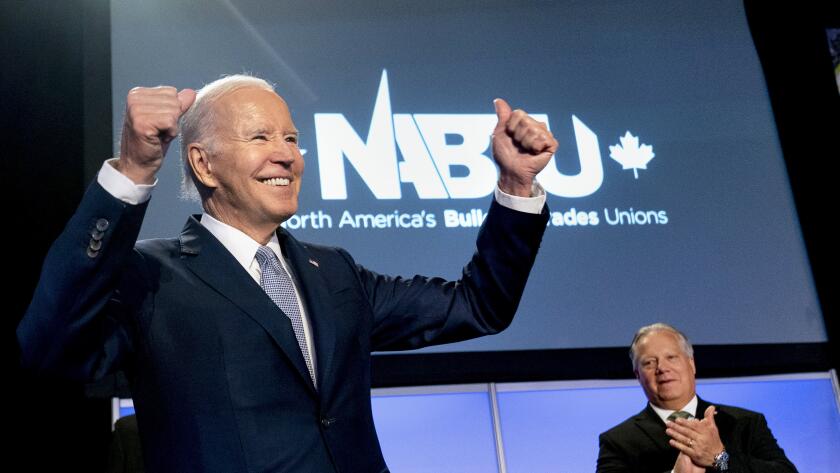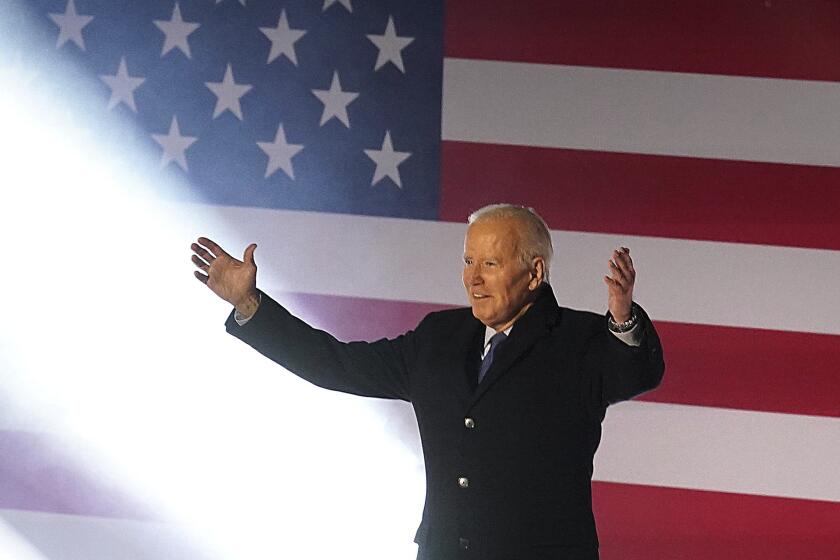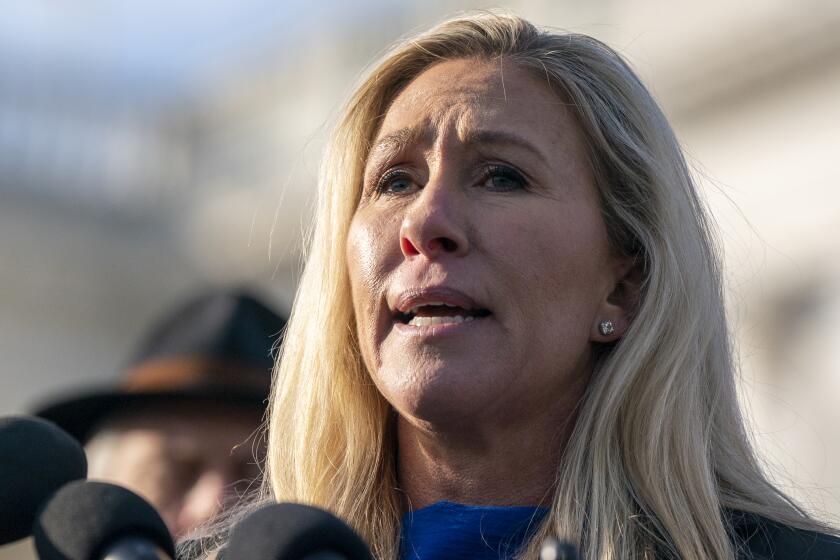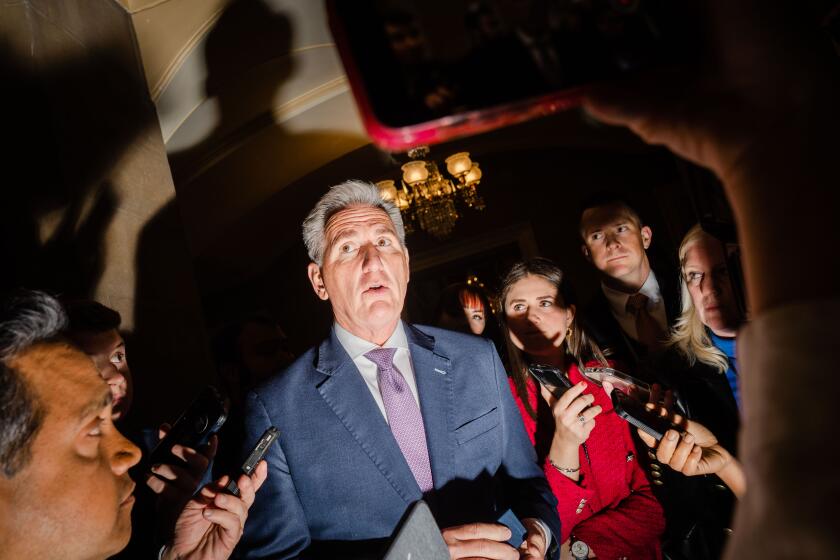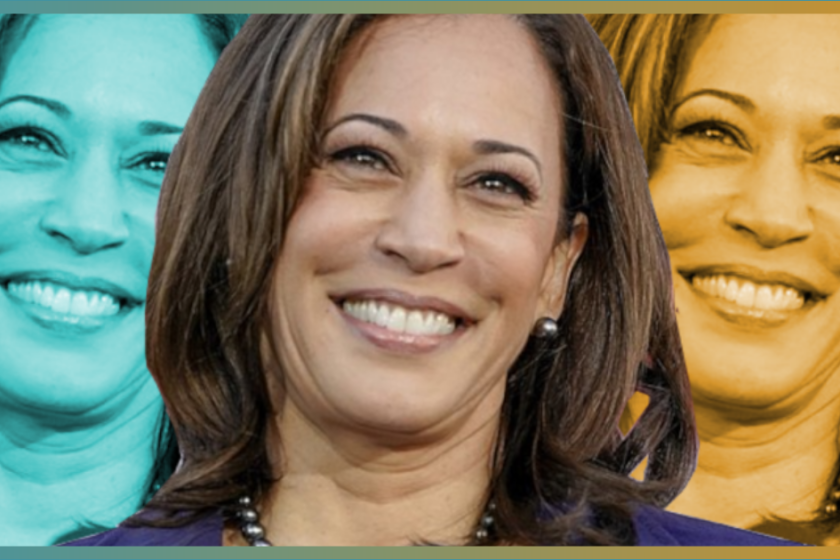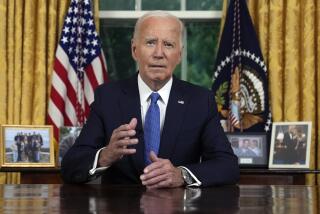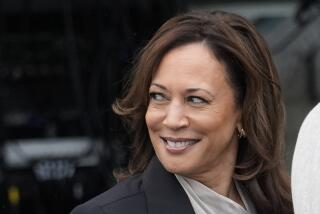Biden announces bid for a second term in 2024
President Biden announces that he will seek the presidency again in 2024, dismissing doubts about whether, at 80, he is fit to serve a second term.
WASHINGTON — President Biden announced Tuesday that he will seek the presidency again in 2024, dismissing doubts about whether he’ll be fit to start a second term when he’s 82, and imploring Americans to let him “finish the job” of preserving a democracy he says is threatened by Republican extremism.
The president announced his campaign in a three-minute video posted to his Twitter account.
“I said we are in a battle for the soul of America, and we still are,” Biden said in a video featuring images of him and Vice President Kamala Harris — who will be on the ticket again — crisscrossing the country.
The 2024 election is a choice between “more freedom or less freedom. More rights or fewer,” he said.
The much-anticipated announcement sets up a potential rematch between Biden and former President Trump, who has already declared his candidacy and leads the field of Republican 2024 hopefuls.
Biden, a self-described “great respecter of fate,” has weighed the decision for months amid speculation about whether he would run again at his age: The nation’s oldest president, he will be just shy of 82 on election day in 2024.
Seventy percent of Americans, including 51% of Democrats, said in an NBC poll released Sunday that they didn’t want Biden to seek a second term, compared with 26% of Americans who said they want him to run. Nearly half of all voters in the poll who said they didn’t want Biden to run again pointed to his age as a major reason.
Biden’s standing with the public remains mediocre at best. But in his reelection bid, he has a couple of major advantages. Donald Trump is one. Democrats returning to the fold is another.
Similarly, about half of Democrats surveyed think Biden should run for a second term, an increase from the 37% who said in January that he should seek office again, according to an Associated Press-NORC Center for Public Affairs Research poll released Friday. But 81% of Democrats said they would probably support him if he were the nominee. Just 26% of Americans overall in the poll said they wanted to see Biden run again.
But the president and his allies have dismissed such polling, pointing instead to U.S. job growth and his legislative record as evidence of his success during his first two years in office.
The White House frequently promotes the passage of a $1.9-trillion COVID relief bill, bipartisan legislation to overhaul the nation’s crumbling infrastructure and boost U.S.-based chip manufacturing, and a $700-billion landmark climate change and drug-pricing law.
Biden previewed his reelection pitch in his Tuesday morning video, deriding “MAGA extremists” for threatening to strip away abortion protections, voting rights and Social Security. He accused Republicans of “dictating what healthcare decisions women can make, banning books and telling people who they can love.”
“Every generation of Americans has faced a moment when they’ve had to defend democracy. Stand up for our personal freedoms. Stand up for the right to vote and our civil rights,” he says as a montage flashes images of him meeting Americans and crossing the Edmund Pettus Bridge in Selma, Ala. “And this is our moment.”
Hours later, chants of “four more years” erupted as Biden addressed labor union leaders at a conference in Washington.
Biden said that he looked at the world through a blue-collar lens, but that Trump, House Speaker Kevin McCarthy (R-Bakersfield) and “MAGA extremists,” are “cut from a different cloth.” They threatened to derail the progress his administration has made for the working class, he argued.
“Let’s finish the job! ... We’re on the cusp of major change,” he said.
The race for former President Trump’s favor to be his running mate for vice president is heating up, with the first Republican presidential primaries nearly a year away.
Biden previously hinted at his reelection message in his State of the Union address in February, in which he contrasted his achievements with a divided Republican Party that had yet to settle on a 2024 strategy or candidate. He called on Congress to work with him to “finish the job” of revitalizing the U.S. economy and uniting a country fractured by partisan politics.
Although he had not officially launched his campaign, aides and Democratic officials had already quietly begun setting up the campaign infrastructure in battleground states across the country.
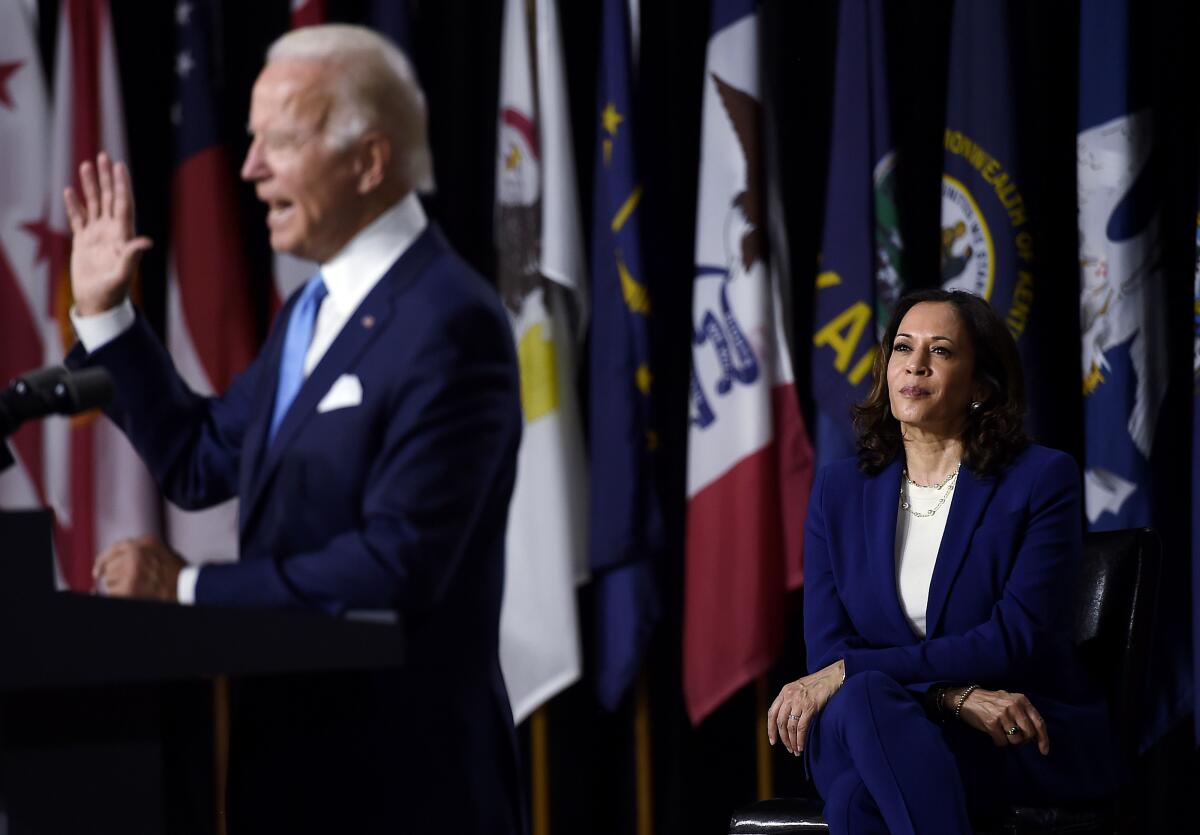
Republican National Committee Chairwoman Ronna McDaniel criticized Biden as “out of touch” after his announcement Tuesday, and accused the president of “creating crisis after crisis” on inflation, crime and fentanyl trafficking.
As Biden took office amid the COVID-19 pandemic that paralyzed the country for more than a year, he vowed to get the coronavirus under control and repair the economic damage wrought by the global health crisis.
His first year in office was bogged down by economic challenges, including record-high inflation and supply chain bottlenecks exacerbated by the pandemic, which lingered longer than White House officials had anticipated.
The public’s mood worsened in August 2021, when waves of new virus variants spread across the country and 13 U.S. troops and scores of Afghans were killed during the military’s messy withdrawal from Afghanistan. The president’s approval rating sank to the low 40s, where it remains.
House Speaker Kevin McCarthy made clear he would leverage his party’s majority in the lower chamber to push President Biden to accept spending cuts.
But in February 2022, as Biden continued to grapple with problems at home, Russia invaded Ukraine. The president responded by reinvigorating transatlantic cooperation and winning bipartisan support to send tens of billions of dollars in economic and military aid to the embattled country.
The administration celebrated several legislative victories last summer, including the most sweeping gun reform legislation in 30 years, the president’s signature climate and drug-pricing law, and a healthcare bill for veterans injured by wartime exposure to toxic substances. He also signed ratification documents in support of Finland’s and Sweden’s membership in the North Atlantic Treaty Organization, highlighting U.S. leadership in expanding NATO’s defense alliance.
November’s midterm election results gave Biden a tailwind after Democrats outperformed historical trends despite his low approval ratings, defying projections of a “red wave.” The party narrowly lost the House of Representatives and picked up a seat in the Senate. Democrats also won control of four additional state legislative chambers and two governorships, the best first midterm performance for a party since President Franklin D. Roosevelt’s presidency.
Biden’s political fortunes took a turn in January, when the Justice Department appointed a special counsel to examine whether he had mishandled classified documents found at his former office at a think tank in Washington and at his home in Wilmington, Del.
Republicans argued that Biden was treated differently than Trump, who is also under investigation over classified documents taken from his Mar-a-Lago resort during an August raid. The facts of the two cases are different: Biden’s lawyers immediately notified the National Archives upon discovery of the documents in his possession; Trump resisted turning over sensitive materials for several months.
Biden’s document controversy has fueled GOP-led House inquiries into the president, his administration and his family, but White House aides argue that the special counsel investigation will have little effect on the 2024 election. Former Vice President Mike Pence later announced that classified documents had also been discovered at his Indiana home, which suggests there’s a systemic problem with the handling of classified material in Washington.
A majority of Americans surveyed believe both Biden and Trump mishandled classified files, according to an ABC News/Ipsos poll released in January. Seventy-seven percent said Trump had acted inappropriately in the way he handled classified documents, compared with 64% who said the same of Biden.
It’s still unclear whom Biden will run against, as the Republican presidential primary is still taking shape. Trump — who is embroiled in a series of investigations and has been charged in connection with an alleged hush-money payment made to a porn actor during the 2016 campaign — is the leading candidate. Nearly 70% of Republican primary voters said they would back him, according to the NBC poll.
President Biden has given no indication in public or private that he plans to replace Kamala Harris. Still, there is speculation because that’s the nature of the vice presidency.
Former South Carolina Gov. Nikki Haley, conservative talk radio host Larry Elder and former Arkansas Gov. Asa Hutchinson are among those who have already entered the GOP race; Pence, Florida Gov. Ron DeSantis and Virginia Gov. Glenn Youngkin are also eyeing White House runs.
Minutes after the president’s announcement Tuesday, the Biden-Harris campaign released an email announcing election staff, including Julie Chavez Rodriguez, director of the White House Office of Intergovernmental Affairs and a longtime Democratic Party activist, as campaign manager. Chavez Rodriguez is the granddaughter of labor and civil rights leader Cesar Chavez. Quentin Fulks, who was campaign manager for Sen. Raphael Warnock (D-Ga.), was tapped as deputy campaign manager.
Among Biden’s campaign co-chairs is Hollywood mega-donor Jeffrey Katzenberg, along with Reps. Lisa Blunt Rochester (D-Del.) and James E. Clyburn (D-S.C.) and Michigan Gov. Gretchen Whitmer.
The president’s springtime decision is in line with most of his recent predecessors’ reelection announcements: Former Presidents Obama, George W. Bush and Clinton launched their campaigns between April and June. (Trump filed his reelection paperwork with the Federal Election Commission on the day he was inaugurated in 2017, and officially kicked off his campaign in June 2019.) But unlike with Biden, there was never any doubt about whether these incumbents would run.
Biden’s announcement comes exactly four years after he declared his candidacy for the 2020 race.
More to Read
Get our L.A. Times Politics newsletter
The latest news, analysis and insights from our politics team.
You may occasionally receive promotional content from the Los Angeles Times.
